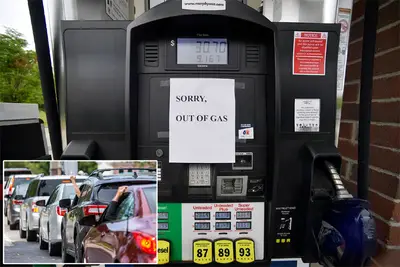What The Colonial Pipeline Shutdown Teaches US About Ethanol Fuel
US as in the worldwide collective WE, and US as in the U.S. of America
By Marc J. Rauch
Exec. Vice President/Co-Publisher
THE AUTO CHANNEL
 Marc Rauch |
Over the years, as Bob Gordon and I have advocated ethanol as a fuel for internal combustion engines, we've often been confronted with a curious objection to ethanol. The objection is that ethanol fuel is impractical because it can't be shipped over long distances via pipeline. The reasons given for why ethanol can't be shipped via pipeline are that it's too evaporative or that it's too corrosive, or both at the same time.
Like all objections to ethanol fuel, this complaint is just a negative myth invented by the oil industry and spread largely by unthinking individuals.
Ironically, even if the negative myths were true, now that we've experienced what some computer hackers could do to America and other parts of the world with the right keystrokes, it would be an advantage for ethanol fuel if it couldn't be shipped by pipeline.
It's almost insane to argue that the same people who manufacture pipeline that's resistive to water and gasoline corrosion and evaporation couldn't manufacture pipeline that's resistive to ethanol corrosion and evaporation. They most definitely can and do. In actuality, ethanol fuel is successfully shipped by pipeline in Brazil and in Florida.
But there's a very sound business reason why ethanol fuel distribution doesn't rely more on pipelines, and doesn't have to be shipped via pipelines over long distances. And, this reason is one of the most important things that sets ethanol fuel apart from petroleum oil-based fuels. Ethanol is, and can be, produced everywhere and anywhere. It follows a different business model than the oil industry; a model that's closer to the dairy industry business model. It doesn't require specialized and secluded places to distill ethanol, unlike the refining of petroleum oil fuels. For one thing, ethanol distilleries are nowhere near as hazardous and explosive. An ethanol fire can be extinguished relatively easy with water. Ethanol distillation also doesn't create a nauseating smell the way that petroleum refineries do. The aromas of ethanol distillation, especially with corn is very appetizing - it smells like you're making popcorn. Almost everyone loves the smell of popcorn.
As of January 1, 2020, there were only 135 operable petroleum refineries in all of the United States. By comparison, there are about 800 "distilleries" in the Napa, Sonoma, and Mendocino wine counties of Northern California. There are another several hundred or so "distilleries" in the wine regions of nearby El Dorado, Placer, Sacramento, Amador, San Joachim, and Monterey counties. Of course, in the strictest sense, these aren't distilleries, they're wineries. But the process of distilling high-proof spirits is as safe and uncomplicated as making wine for a simple reason, the fermenting of some type of plant life is part of the process of distilling high proof spirits. Added to the vast number of wineries in Northern California, there are several hundred beer breweries and a few dozen whiskey/vodka/brandy distilleries. Funnily enough, the fermented liquid that's distilled into high proof ethanol is often called "beer."
The point I'm making is that we can have ethanol fuel producing plants everywhere, just as there are dairy farms everywhere. Beer breweries are everywhere; wineries are everywhere. They can be as close as your next-door neighbor. They are as safe as if they are your next-door neighbor, and the proof is that in all the above-mentioned California counties, there are huge residential communities in and around these "distilleries."
At the risk of overstating this point, consider that there are about 500 beer breweries in New York State (35 breweries in just Brooklyn, and about two dozen in Manhattan alone), along with another 470 wineries in the state. By comparison, there are zero oil refineries in New York. Virginia motorists were hard hit by the Colonial Pipeline debacle. There are no oil refineries in Virginia. There are, however, about 300 wineries and 200 beer breweries in Virginia. There are also more than 40 distilleries making drinkable ethanol in Virginia, plus one ethanol-fuel plant.
This means that we don't need any hack-able or attack-able long distance pipelines to ensure a constant ample supply of engine fuel. We don't have to deploy our military around the world to defend ethanol production. We don't have to rely on slave labor-style production in Africa to mine for elements needed to make ethanol.
The solution to the pollution and illnesses caused by petroleum oil-based fuels is ethanol fuel. The solution to fuel shortages caused by terrorist hacking, as well as deadly rail and ocean shipping accidents, or accidents from natural events (like hurricanes, tornados, and earthquakes) is ethanol fuel produced locally.
There are a rash of stories about how electric vehicles are the solution to the evils of petroleum oil fuel and computer hacking. This is incorrect, they're not and can't be the solution because the electric power to charge the vehicles can be attacked as easily - if not easier - than oil industry pipelines. And, we know from experience, that aging electric lines required to transmit electricity can fail all on their own, igniting huge raging firestorms that kill thousands of living creatures and destroy billions of dollars worth of properties and other assets.
The lesson to be learned from the Colonial Pipeline incident is the same lesson that should have been learned in the 1970s: Ethanol is the solution.
To paraphrase a rallying cry from the '70s: "If ethanol is not the solution, there's a big problem."
Marc Rauch is the author of "THE ETHANOL PAPERS" and the recently published
"YES, TIN LIZZIE WAS AN ALCOHOLIC"



